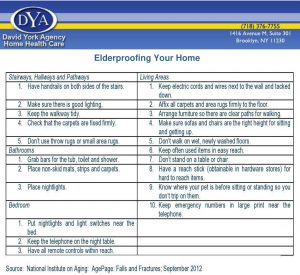There is an ever growing trend of seniors resisting leaving their home and opting to age-in-place. They cite emotional attachment, the comfort of a familiar place, and retaining independence as arguments why they don’t want to move. In view of that, perhaps they don’t always have to. According to the United States of Aging survey, 75% of seniors plan to stay put. To that end, with a bit of adjusting, they may very well be able to.
Seniorproofing Homes
According to Rodney Harrell, director of livability thought leadership for AARP, out of 100 million homes across the country, only approximately 1% of them are designed and outfitted for an elderly person to live safely and easily. On the positive side, there are things that could be done to an elderly loved one’s home that will enable them to stay.
Home Matters, AARP, the AARP Foundation, Wells Fargo, the Home Depot Foundation and Dwell magazine sponsored a competition among designers and architects. These professionals were asked to create the home of the future. Interestingly, many of the entries, including the winning one, incorporated a concept called universal design. This is a home design that incorporated products and elements in such a way that it would be usable by various types of people. These include those with a wide range of ages and physical abilities.
Remodeling With Safe Updates for Seniors
Consider these features when remodeling an senior’s home:
-
low or no threshold doorways
-
widening doorways
-
lever types of doorknobs and faucet handles
-
lower countertops
-
curbless shower stalls
-
open concept floor plan
-
slip resistant floors
-
more windows
-
lower placement of light switches
For a more complete list of renovations, visit this checklist found on NAHB’s (National Association of Home Builders) website. It would be worthwhile to consult one of their Certified Aging In Place Specialists (CAPS) when considering these modifications.
Cost/Benefit Ratio
While aging-in-place considerations stretch far beyond the financial into areas of quality of life, we must always crunch numbers. Ostensibly, the idea of updating a home can seem cost-prohibitive. Nonetheless, consider it against what it would cost to place a senior in an assisted living facility or nursing home. According to this 2011 article from AARP, an assisted living facility can cost around $40,000; a private room in a nursing home will run about $84,000. However, both of these estimates are per year costs. So, while the cost of an update might be just as expensive, it is a one-time expense as opposed to a yearly recurring one.
DYA Has An Expert CAPS Specialist
We have a Certified Aging In Place Specialist (CAPS) on staff who could advise you on how to make your senior loved ones home safe. To that end, our home safety specialist will do a thorough review of the areas of your home including the kitchen, bathrooms, bedrooms, and living room. He will provide you with an assessment of what needs to be amended along with an action plan for implementation. Hence, if you are considering remodeling your loved one’s home so that they can age-in-place, contact us. We’d be happy to discuss what modifications we think might be appropriate to accomplish this.

We Can Help
For more information about David York Agency’s qualified, compassionate caregivers, contact us at 908.373.5300. A free phone consultation can help. You can decide what services might be best to provide you and your loved one with the assistance they need. If you’d like to hear more from us, please like us on Facebook or follow us on Twitter, or LinkedIn.







